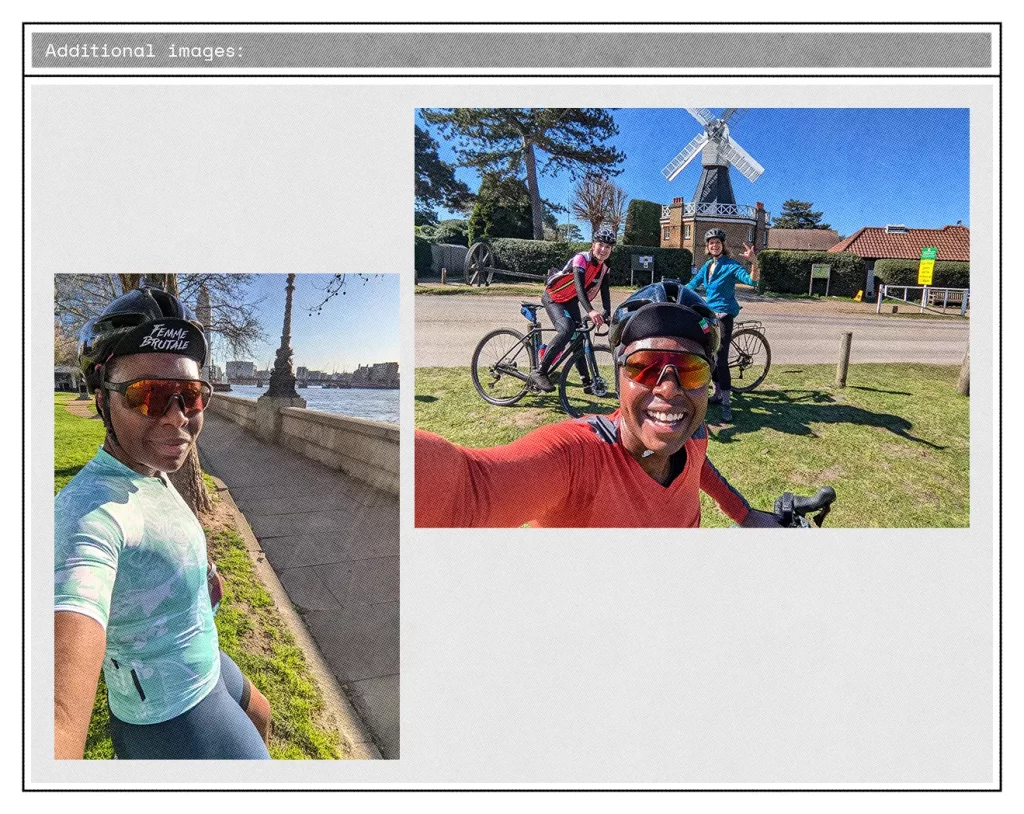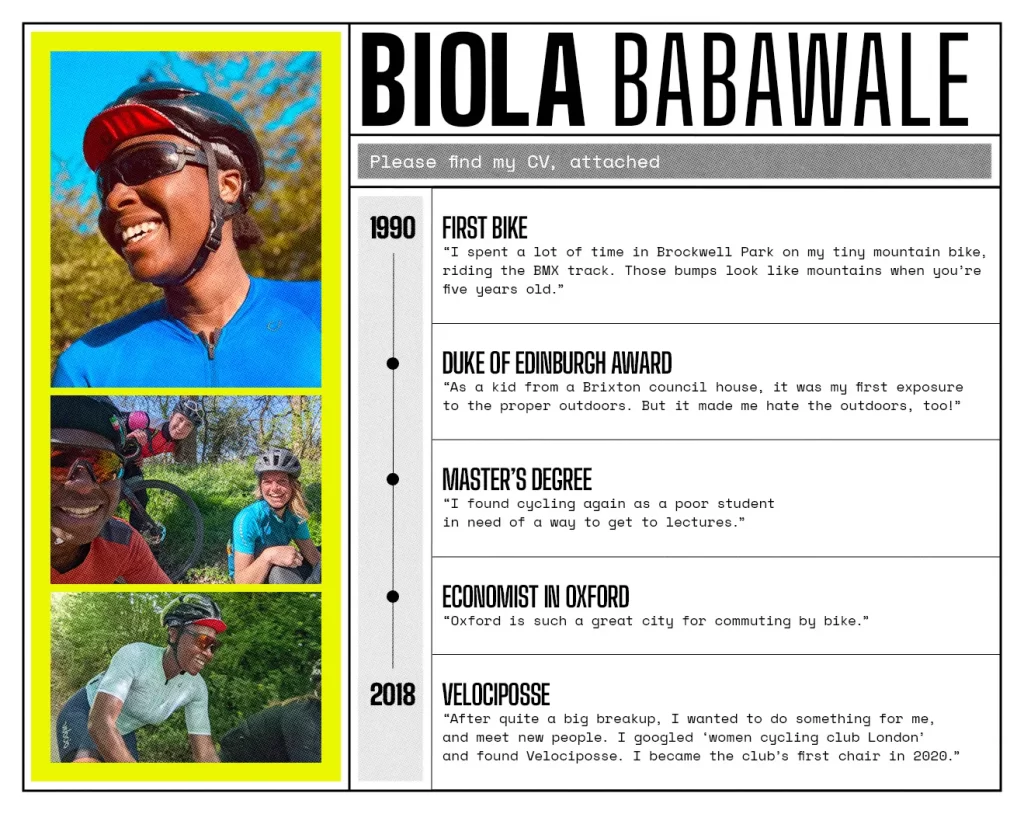The former chair of Velociposse on the future of non-binary and trans competition, busting the balls of global brands, and the scary similarities between cycling and The Wolf Of Wall Street…
If you’re going to live in a London flat and manage an obsession with cycling, you need to get creative.
It’s advice that Biola Babawale, dialling in from her Brixton pad, offers up when we applaud the bespoke open-fronted shelving system behind her. Alongside the Pinterest-friendly plants and books and lamps that any 30-something’s capital dwelling needs by interior-design law, her gravel and road bikes hang neatly and vertically like freshly pressed shirts at your local dry cleaners. We’ll never be able to look at a sad, sorry, shed-bound bike in the same way again.
Plywood shelving aside, creativity and cycling have also defined the last five years of Biola’s work with Velociposse – the member-run cycling community she discovered after a post-breakup google search in 2018. As the group’s first chairperson, the vital work her and her team have done, and continue to do, for women, and trans and non-binary people, brought ACM and Velociposse together in 2022, when we told their story of inclusivity and diversity as part of our full-production film series for adidas Cycling’s Push For Change campaign.
Biola’s bold ideas, innovative actions, and advocacy for a better outdoors perfectly sum up what makes an ACM Outsider Insider. And having just relinquished the Velociposse hot seat to concentrate on new start-up ventures (and a successful career in finance), we grabbed an hour early one Monday to talk about her bikeless route into the heart of the Velociposse community, where trans cycling is at in 2023, the work that still needs to be done around inclusivity, and the satisfaction that comes with telling household brands to “go do one”…

I rocked up to my first Velociposse session without a bike. I went through a breakup in 2018 and left the situation realising I didn’t actually have many female friends, and wanting to do something for me. I wanted to find other women who shared my passions and could teach me to get outdoors. So I googled ‘women’s cycling clubs London’, waded through some really intense-looking clubs, and found Velociposse’s Instagram. Everyone was smiling, everyone looked like they loved Lycra as much as I do, everyone looked great. I was sold.
I was riding 80km through Essex four months later. I was addicted.
I was Velociposse’s chair for three years. I’ve taken on chair roles at other organisations and I’ve learned that a good chair knows when to hand over the reins. I’ve achieved what I wanted for Velociposse, and I feel I’ve left it in a better place than when I joined, so it’s time for someone else to step in. Of course, I’m still a Velociposse member!
Trans and non-binary cycling isn’t in a good place right now.Because it’s a complex and hard-to-understand subject, the board-level approach is to implement a competitive ban before bringing any form of progressive discussion to the table. It’s so harmful for those in the trans and non-binary communities who already feel rejected and excluded in their day-to-day lives.
The argument that is put forward is always about protecting the sanctity of the sport. It’s about exclusion, rather than a positive and progressive approach informed by community discourse. When people engage with this debate, it feels like they forget they’re talking about human beings.
There are some amazing things happening at a grassroots level, though. I’m seeing race organisers going out of their way to explore competition outside of traditional binary frameworks.
ThunderCrit organises fixed-gear crit races. They’ve shown trans and non-binary inclusivity can happen and benefit not just the minority, but the majority, too. They’ve used categories based on ability, rather than gender, so that people race against others with similar grades. It’s brilliant. It feels so progressive. And I’ve seen participants – men, women, non-binary, trans – absolutely loving racing within this framework.
When brands come to me, I really break their balls. The first question I ask a brand is, “So what do you do to turn up in your community?”.
I want to hear about the different programmes the brand is engaging with locally, but also globally. I want to hear about their aspirations. I want to hear how they see our relationship living beyond a shoot or campaign, and how its legacy can benefit the wider community in the future.
Too many brands see communities as a commodity. They see their brand as doing us a favour. I really enjoy getting requests like this from brands, because I love telling them to go do one.
These aren’t small brands, by the way. These are global brands you’ll be very familiar with.
I’ve said “no” to brand collaborations plenty of times. The hit ratio is probably one in ten.
When I started cycling in 2018, it was like The Wolf Of Wall Street. The discussions I was hearing, the imbalances in power, the misogyny – it was insane. I work in finance, and that industry has come a long way since the 80s. It’s multicultural, and women are better represented. But cycling really made me doubt the spaces I worked in. A lot of the guys riding were from well-to-do finance backgrounds. In the construct of the office, half of the things I was hearing would be straight-up illegal, but these “biker bros” were saying these things on their bikes? Cycling was a boys’ club that really loved being a boys’ club.
Things have moved on a lot in the last five years. Cycling is in a better place because of the spaces and races created by incredibly determined women and people of colour. Spaces and places that the boys’ club now wants to be a part of!
Around 40 percent of UK women wear size 16 clothes. The majority of cycling apparel brands don’t make apparel that reaches this size and beyond. It boils my blood. If you want a more general indication of how big the barriers are in cycling, there it is. It’s not “Italian sizing”. It’s a lack of inclusivity, and shows how much work is left to do.
I’m working on a new start-up with my brother. It’s called Cycle Together, and it’s a cycling version of Couch to 5K that, through programmes, is very much focused on getting more people of colour and marginalised communities on bikes.
I’m an outdoor person now. I bikepack. I camp. I have a tent. There are a lot of things that I’ve done with Velociposse that I never thought I would do… and now love doing.
Biola Babawale: A Résumé
Ever wondered what kind of work experience gets you a top position in the outdoors? Here’s one way of doing it…
